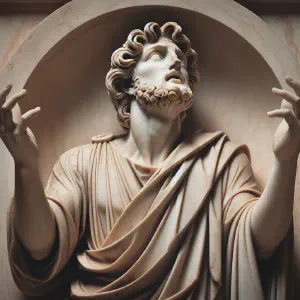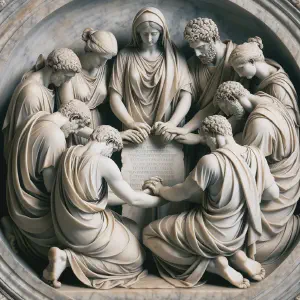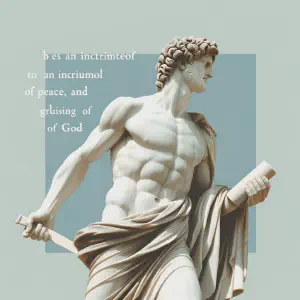Echoes of Divine Promise
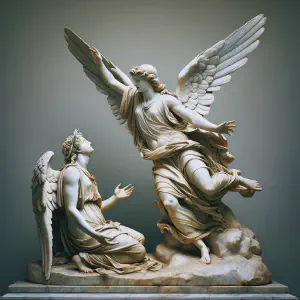
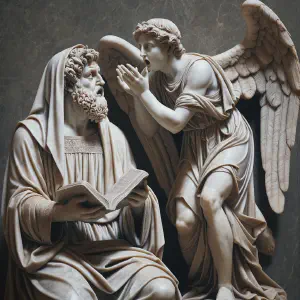
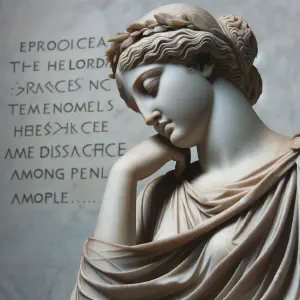
Both narratives, interwoven with divine intervention, echo the theme of miraculous births and God’s power to bring hope and change through seemingly impossible circumstances. Samson and John, born of divine promise, were set apart for purposes that would shape the history and faith of their people, embodying the wonders of God’s plans unfolding in human lives.
Five Questions
What is the significance of the angel’s announcement to Manoah’s wife in the story of Samson?
The angel’s announcement to Manoah’s wife is significant for several reasons. First, it highlights God’s intervention in the lives of His people, particularly in situations that seem hopeless, like Manoah’s wife’s barrenness. Second, the announcement sets the stage for Samson’s role as a Nazirite, consecrated to God from birth, indicating his special purpose in God’s plan for Israel. This narrative emphasizes God’s sovereignty and the miraculous ways He can fulfill His promises.
How does the story of Samson’s birth compare to the announcement of John the Baptist’s birth in the Gospel of Luke?
Both stories involve miraculous births announced by angels to previously barren women, illustrating God’s power to bring life and hope in situations that appear impossible. Additionally, both Samson and John the Baptist were set apart for specific, divinely ordained purposes from before their births. While Samson was to begin the deliverance of Israel from the Philistines, John the Baptist’s role was to prepare the way for Jesus, turning the hearts of the people back to God.
What role does faith play in these biblical narratives?
Faith is central to these narratives. In both cases, the characters demonstrate faith in God’s promises, despite their seemingly impossible circumstances. Manoah’s wife accepts the angel’s message without question, while Zechariah’s initial doubt and subsequent punishment for it underline the importance of believing in God’s word. These stories teach that faith is not just believing in God’s existence, but also trusting in His timing, plans, and the fulfillment of His promises.
How do the themes of hope and deliverance manifest in these readings?
The themes of hope and deliverance are woven throughout these readings. In the story of Samson, there is hope for deliverance from the Philistines, a significant oppressor of Israel at the time. In the announcement of John the Baptist’s birth, there is the hope of spiritual deliverance and the turning of hearts towards God. Both narratives point towards a future where God’s intervention leads to liberation, both physical and spiritual, reinforcing the idea that hope in God is never in vain.
What lessons can modern readers take from the Psalm and the stories of Samson and John the Baptist?
Modern readers can learn several lessons from these scriptures. Firstly, that God is actively involved in the world and works through individuals for His greater purpose. Secondly, that in times of difficulty or barrenness, whether literal or metaphorical, there is always hope for a divine intervention. Finally, these stories encourage readers to trust in God’s timing and plan, reminding us that even in our uncertainty, God is working towards a future filled with grace and redemption.
Bible Study
Judges 13:2-7, 24-25a
There was a certain man from Zorah, of the clan of the Danites,
whose name was Manoah.
His wife was barren and had borne no children.
An angel of the LORD appeared to the woman and said to her,
“Though you are barren and have had no children,
yet you will conceive and bear a son.
Now, then, be careful to take no wine or strong drink
and to eat nothing unclean.
As for the son you will conceive and bear,
no razor shall touch his head,
for this boy is to be consecrated to God from the womb.
It is he who will begin the deliverance of Israel
from the power of the Philistines.”
The woman went and told her husband,
“A man of God came to me;
he had the appearance of an angel of God, terrible indeed.
I did not ask him where he came from, nor did he tell me his name.
But he said to me,
‘You will be with child and will bear a son.
So take neither wine nor strong drink, and eat nothing unclean.
For the boy shall be consecrated to God from the womb,
until the day of his death.’”
The woman bore a son and named him Samson.
The boy grew up and the LORD blessed him;
the Spirit of the LORD stirred him.
This passage narrates the birth of Samson to Manoah and his barren wife, foretold by an angel. Samson, a Nazirite from birth, is consecrated to God, symbolizing dedication and purity, resonating with Catholic values of sanctity and divine purpose. His role in delivering Israel from the Philistines aligns with themes of divine intervention and justice. The narrative echoes Catholic teachings on faith in God’s plans and the sanctity of life from conception, as outlined in the Catechism.
Psalm 71:3-4a, 5-6ab, 16-17
R. (see 8) My mouth shall be filled with your praise, and I will sing your glory!
Be my rock of refuge,
a stronghold to give me safety,
for you are my rock and my fortress.
O my God, rescue me from the hand of the wicked.
R. My mouth shall be filled with your praise, and I will sing your glory!
For you are my hope, O LORD;
my trust, O God, from my youth.
On you I depend from birth;
from my mother’s womb you are my strength.
R. My mouth shall be filled with your praise, and I will sing your glory!
I will treat of the mighty works of the LORD;
O God, I will tell of your singular justice.
O God, you have taught me from my youth,
and till the present I proclaim your wondrous deeds.
R. My mouth shall be filled with your praise, and I will sing your glory!
This Psalm is a prayer for protection and deliverance, expressing trust in God from youth. It emphasizes the Catholic values of lifelong faith, dependence on God’s strength, and recognition of His justice and mighty works. The Psalm aligns with the Catholic teachings on God as a refuge and fortress, reflecting themes of the Acts of Mercy, especially comforting the afflicted and praying for the living and the dead. It underscores the importance of proclaiming God’s deeds, a fundamental aspect of Catholic witness and evangelization.
Luke 1:5-25
In the days of Herod, King of Judea,
there was a priest named Zechariah
of the priestly division of Abijah;
his wife was from the daughters of Aaron,
and her name was Elizabeth.
Both were righteous in the eyes of God,
observing all the commandments
and ordinances of the Lord blamelessly.
But they had no child, because Elizabeth was barren
and both were advanced in years.
Once when he was serving as priest
in his division’s turn before God,
according to the practice of the priestly service,
he was chosen by lot
to enter the sanctuary of the Lord to burn incense.
Then, when the whole assembly of the people was praying outside
at the hour of the incense offering,
the angel of the Lord appeared to him,
standing at the right of the altar of incense.
Zechariah was troubled by what he saw, and fear came upon him.
But the angel said to him, “Do not be afraid, Zechariah,
because your prayer has been heard.
Your wife Elizabeth will bear you a son,
and you shall name him John.
And you will have joy and gladness,
and many will rejoice at his birth,
for he will be great in the sight of the Lord.
He will drink neither wine nor strong drink.
He will be filled with the Holy Spirit even from his mother’s womb,
and he will turn many of the children of Israel
to the Lord their God.
He will go before him in the spirit and power of Elijah
to turn the hearts of fathers toward children
and the disobedient to the understanding of the righteous,
to prepare a people fit for the Lord.”
Then Zechariah said to the angel,
“How shall I know this?
For I am an old man, and my wife is advanced in years.”
And the angel said to him in reply,
“I am Gabriel, who stand before God.
I was sent to speak to you and to announce to you this good news.
But now you will be speechless and unable to talk
until the day these things take place,
because you did not believe my words,
which will be fulfilled at their proper time.”
Meanwhile the people were waiting for Zechariah
and were amazed that he stayed so long in the sanctuary.
But when he came out, he was unable to speak to them,
and they realized that he had seen a vision in the sanctuary.
He was gesturing to them but remained mute.
Then, when his days of ministry were completed, he went home.
After this time his wife Elizabeth conceived,
and she went into seclusion for five months, saying,
“So has the Lord done for me at a time when he has seen fit
to take away my disgrace before others.”
This passage details the announcement of John the Baptist’s birth to Zechariah and Elizabeth. Both are described as righteous, living in accordance with the commandments – a reflection of Catholic values of holiness and obedience to God’s law. The angel Gabriel’s announcement highlights God’s grace in their lives, embodying Catholic beliefs in divine grace and providence. John’s forthcoming role as a precursor to Christ aligns with the Church’s teachings on preparing for the Lord, emphasizing repentance and spiritual renewal, core aspects of Catholic faith and practice.
Lessons
These passages teach us the power of faith and hope in the midst of uncertainty. The stories of Samson and John the Baptist’s miraculous births remind us that God often works in ways beyond our understanding and expectations. They underscore the importance of trust in God’s plan, even when it defies our conventional wisdom or current circumstances. Both narratives highlight the significance of being open to God’s grace and the transformative potential it holds for individuals and communities. In humility, we learn that God’s promises are sure and His timing perfect, guiding us toward a future filled with His divine purpose and love.
Meditation Prayer
